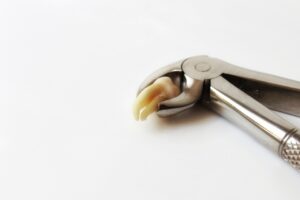After wisdom tooth removal, swelling, bleeding, and discomfort are normal. Understanding how to manage these symptoms is vital for a quick recovery. To reduce swelling, apply an ice pack to the outside of your cheek. You should do this in intervals of 20 minutes on, followed by 20 minutes off, during the first 24 to 48 hours. This technique helps reduce swelling and minimizes bruising, providing you with better comfort during the initial recovery phase.
To stop bleeding, gently bite down on a piece of clean gauze placed over the extraction site. Replace the gauze every 30 to 45 minutes, or until the bleeding stops, which typically happens within a few hours after surgery. To manage discomfort, follow your dentist’s instructions for pain medications. Over-the-counter options, such as ibuprofen, can also help manage pain and reduce inflammation. Remember, mild to moderate discomfort is normal during the healing process after wisdom teeth removal, but if your symptoms worsen, contact your dentist right away. Following these steps will help ensure a quick recovery, letting you focus on healing and getting back to your routine.
Diet and Oral Hygiene After Surgery
It’s essential to follow proper wisdom tooth removal aftercare to support quick recovery. For the first few days, eat soft foods like yogurt, applesauce, mashed potatoes, and smoothies to avoid irritating the extraction site. Stay away from hard, crunchy, or spicy foods that could disrupt blood clots needed for healing. Also, avoid using straws, as suction can cause a painful condition called dry socket. Be sure to drink plenty of water to stay hydrated and help with the healing process.
When it comes to brushing teeth after wisdom teeth removal, it’s essential to be gentle and cautious. In the first 24 hours after surgery, avoid brushing the area near the extraction site. As you continue with your oral care, use a soft-bristled toothbrush and gently clean your teeth while avoiding the surgical area to prevent irritation. Rinse your mouth with a saline solution or an antiseptic mouthwash prescribed by your dentist to help reduce the risk of infection. Usually, you can return to your regular teeth brushing routine within a week or as advised by your dentist.
Remember, if you notice any unusual symptoms or have concerns about your recovery, especially after having your wisdom tooth removed in St. Catharines, don’t hesitate to use our dental emergency contact details for assistance. Prompt attention to any complications is essential for a successful recovery.

